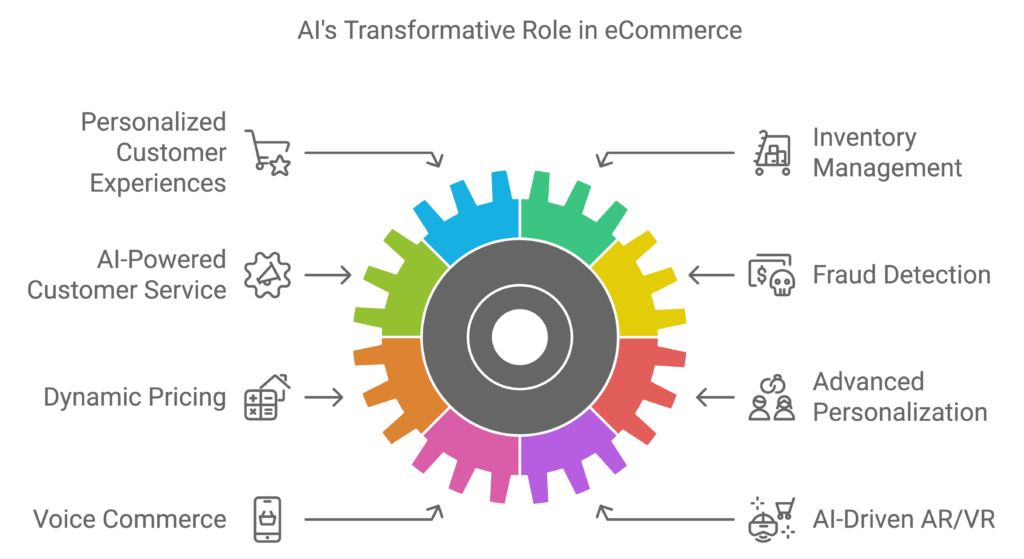The eCommerce landscape has undergone a seismic shift over the past few years, and at the heart of this transformation is Artificial Intelligence (AI). As we navigate through 2024, AI continues to redefine how businesses operate online, offering innovative solutions to scale operations and adapt to ever-evolving market challenges. In this blog post, we’ll delve into the current and future impact of AI in eCommerce and explore how it’s empowering businesses to thrive in a competitive environment.

The Current Impact of AI in eCommerce
Personalized Customer Experiences
One of the most significant contributions of AI to eCommerce is the ability to offer personalized shopping experiences. AI algorithms analyze customer behavior, browsing history, and purchase patterns to recommend products that align with individual preferences. This level of personalization not only enhances customer satisfaction but also boosts conversion rates.
For instance, AI-driven recommendation engines suggest products that customers are more likely to purchase, increasing average order value. Retail giants like Amazon have been leveraging this technology to great effect, setting new standards for personalized shopping.
Inventory Management and Supply Chain Optimization
AI plays a crucial role in optimizing inventory levels and streamlining supply chain operations. Machine learning models forecast demand with remarkable accuracy, allowing businesses to maintain optimal stock levels and reduce holding costs. This predictive capability minimizes the risks of overstocking or stockouts, ensuring that customer demands are met promptly.
AI-Powered Customer Service
The advent of AI-powered chatbots has revolutionized customer service in eCommerce. These intelligent virtual assistants provide instant support, answer queries, and even assist with purchases around the clock. This not only enhances the customer experience but also frees up human resources to handle more complex tasks.
Fraud Detection and Security
AI systems are instrumental in detecting fraudulent activities by analyzing patterns and anomalies in transaction data. They can identify suspicious behavior in real-time, protecting businesses and customers from potential security breaches. This proactive approach to fraud detection enhances trust and reliability in online transactions.
Dynamic Pricing Strategies
AI enables dynamic pricing models that adjust prices based on real-time supply and demand, competitor pricing, and customer behavior. This flexibility allows businesses to maximize profits while remaining competitive in the market.
The Future Impact of AI in eCommerce
Advanced Personalization with AI
As AI technologies evolve, we can expect even more sophisticated personalization. AI will not only recommend products but also create entirely personalized shopping experiences, from customized homepages to tailor-made promotions. This hyper-personalization will deepen customer engagement and loyalty.
Voice Commerce and AI Assistants
Voice-activated AI assistants are set to play a significant role in eCommerce. With the growing popularity of devices like Amazon’s Alexa and Google Assistant, voice commerce is becoming more prevalent. Customers will increasingly use voice commands to search for products, place orders, and manage deliveries, making shopping more convenient than ever.
AI-Driven AR/VR Shopping Experiences
Artificial Intelligence combined with Augmented Reality (AR) and Virtual Reality (VR) technologies will transform the online shopping experience. Customers will be able to virtually try on clothes, visualize furniture in their homes, or test out products before making a purchase, bridging the gap between online and in-store shopping.
Predictive Analytics for Market Trends
AI will enhance predictive analytics, enabling businesses to anticipate market trends and customer needs proactively. By analyzing vast amounts of data, AI can identify emerging patterns, allowing businesses to adjust strategies accordingly and stay ahead of the competition.
AI in Logistics and Delivery
Autonomous vehicles and drones powered by AI are expected to revolutionize logistics and delivery. These technologies will enable faster, more efficient delivery services, meeting the increasing demand for quick and reliable shipping options.
How AI Helps Businesses Scale and Adapt
Automation of Routine Tasks
AI automates repetitive and time-consuming tasks, such as data entry, inventory updates, and customer inquiries. This automation allows businesses to operate more efficiently and allocate resources to strategic areas that drive growth.
Data-Driven Decision Making
AI provides valuable insights through data analysis, helping businesses make informed decisions. Whether it’s optimizing marketing campaigns or adjusting inventory levels, data-driven strategies lead to better outcomes and scalability.
Scalability Through AI Tools
AI tools are scalable solutions that grow with the business. As the volume of data increases, AI systems adapt to handle more complex tasks without significant additional costs, making them ideal for businesses looking to expand.
Adapting to New Challenges
In an ever-changing market, AI equips businesses with the flexibility to adapt quickly. Whether it’s shifting consumer behaviors, supply chain disruptions, or new regulatory requirements, AI systems can adjust operations in real-time, ensuring business continuity.
Challenges and Considerations
Ethical Concerns and AI Biases
While AI offers numerous benefits, it’s essential to address ethical concerns. AI systems can inadvertently perpetuate biases present in their training data. Businesses must ensure that their AI tools are designed and monitored to promote fairness and inclusivity.
Data Privacy and Security
With the increased reliance on data, protecting customer information is paramount. Businesses must adhere to data protection regulations and implement robust security measures to prevent breaches and maintain customer trust.
Integration Challenges
Integrating AI technologies into existing systems can be complex. It requires investment and expertise to ensure seamless integration and functionality. Businesses should plan carefully and possibly seek partnerships with technology providers specializing in AI solutions.
Conclusion
Artificial Intelligence is undeniably transforming eCommerce in 2024, offering innovative ways for businesses to scale and adapt to new challenges. From personalized customer experiences to advanced analytics and automation, AI is reshaping the online marketplace. As we move forward, businesses that embrace AI technologies will be better positioned to thrive in a competitive and rapidly evolving landscape.
It’s an exciting time for eCommerce, and the integration of AI opens up endless possibilities for growth and innovation. By staying informed and proactive, businesses can harness the power of AI to enhance operations, delight customers, and achieve long-term success.







